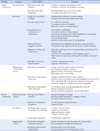Abstract
Purpose
This study was designed to describe the burnout experiences of nurses counseling people living with HIV/AIDS (PLWHA) in hospital-based counseling services in Korea.
Methods
A qualitative research technique with focus group interviews was used and the data were collected in 2012. Participants were 13 counseling nurses from 16 medical hospitals in South Korea who had worked full-time for more than six months as a counseling nurse for PLWHA. The 13 nurses made up 68.4% of all 19 official HIV counseling nurses in South Korea. Data were collected using focus group interviews and analyzed with the content analysis methodology of Downe-Wamboldt.
Results
Burnout experience of counseling nurses for PLWHA was analyzed for two domains-causes of, and effects of burnout. Each domain was classified into three categories; personal, job-related, and relationships. Further 17 sub-categories and 47 concepts were discovered.
Conclusion
In this study various causes and effects of burnout experienced by nurses counseling PLWHA were identified. These findings can be used in developing effective strategies for nurses, administrators, and health policy makers to solve the burnout of counseling nurses. Further research is required to develop detailed and practical job description for nurses counseling PLWHA.
References
1. Carmack BJ. Balancing engagement/detachment in AIDS-related multiple losses. Image J Nurs Sch. 1992; 24:9–14. http://dx.doi.org/10.1111/j.1547-5069.1992.tb00692.x.
2. Cherniss C. Staff burnout: Job stress in the human services. Thousand Oaks, CA: SAGE Publications;1980.
3. Choi YM, Yang NM, Lee JY. Content analysis of Korean counselor burnout. Korean J Couns Psychother. 2002; 14:581–598.
4. Downe-Wamboldt B. Content analysis: Method, application, and issues. Health Care Women Int. 1992; 13:313–321.
5. Han SS, Moon SJ, Yun EK. Empowerment, job satisfaction, and organizational commitment: Comparison of permanent and temporary nurses in Korea. Appl Nurs Res. 2009; 22:e15–e20. http://dx.doi.org/10.1016/j.apnr.2009.06.004.
6. Hayter M. Utilizing the Maslach Burnout Inventory to measure burnout in HIV/AIDS specialist community nurses: The implications for clinical supervision and support. Prim Health Care Res Dev. 2000; 1:243–253.
7. Jayaratne S, Chess WA. Job satisfaction and burnout in social work. In : Farber BA, editor. Stress and burnout in the human service professions. New York, NY: Pergamon Press;1983. p. 129–141.
8. Joinson C. Coping with compassion fatigue. Nursing. 1992; 22(4):116–122.
9. Joo HJ. The Coping behaviors of the people with HIV: Focusing on the male homosexuals. J Korean Acad Psychiatr Ment Health Nurs. 2008; 17(1):97–108.
10. June KJ, Kwon YM, Joo HJ, Kim SJ, Cho KM, Park EH. A comparison of the certification system for nurses in HIV/AIDS care among the U.S., the UK, and Japan. J Korean Acad Nurs Adm. 2007; 13:537–545.
11. Kang SR, Lee HK. Phenomenological study on the experience of labour and burnout among married female nurses. Womens Study Rev. 2012; 29(1):41–78.
12. Kim SJ, Kim HJ, Lee KJ, Lee SO. Focus group methodology. Seoul: Hyunmoonsa Publishing;2000.
13. Korean Centers for Disease Control and Prevention. 2012 HIV/AIDS administration guideline. Cheongju: Korean Centers for Disease Control and Prevention;2012.
14. Krueger RA, Casey MA. Focus groups: A practical guide for applied research. 3rd ed. Thousand Oaks, CA: SAGE Publications;2000.
15. Kwon YM, Cho KM, Joo HJ, Kim SJ, Jeon KJ, Park EH. Development of job description of HIV/AIDS counselling nurse in Korea. J Korean Acad Nurs Adm. 2009; 15:91–105.
16. Maslach C, Pines A. The burn-out syndrome in the day care setting. Child Care Q. 1977; 6(2):100–113.
17. Min YH. (A) study on the recognition of the administrative system of AIDS control: With a focus on the recognition of the infectious person & officials. Seoul, Korea: Hanyang University;2000. Unpublished master's thesis.
18. Murphy GT, Stewart M, Ritchie J, Viscount PW, Johnson A. Telephone support for Canadian nurses in HIV/AIDS care. J Assoc Nurses AIDS Care. 2000; 11(4):73–88. http://dx.doi.org/10.1016/S1055-3290(06)60399-3.
19. Pines AM, Aronson E, Kafry D. Burnout: From tedium to personal growth. New York, NY: Free Press;1981.
20. Raquepaw JM, Miller RS. Psychotherapist burnout: A componential analysis. Prof Psychol Res Pr. 1989; 20:32–36. http://dx.doi.org/10.1037/0735-7028.20.1.32.
21. Rizzo JR, House RJ, Lirtzman SI. Role conflict and ambiguity in complex organizations. Adm Sci Q. 1970; 15:150–163.
22. Shin MH, Shin SR. Predictors of burnout among oncology nurses. J Korean Oncol Nurs. 2003; 3(1):75–84.
23. Shin SB. A study on health related quality of life in people living with HIV/AIDS in Korea. Health Soc Welf Rev. 2011; 31:424–453.
24. Stephen H. Isolation an big factor in HIV nurses' burnout. Nurs Stand. 1998; 13(7):10.
25. Swendeman D, Ingram BL, Rotheram-Borus MJ. Common elements in self-management of HIV and other chronic illnesses: An integrative framework. AIDS Care. 2009; 21:1321–1334. http://dx.doi.org/10.1080/09540120902803158.
26. Visintini R, Campanini E, Fossati A, Bagnato M, Novella L, Maffei C. Psychological stress in nurses relationships with HIV-infected patients: The risk of burnout syndromes. AIDS Care. 1996; 8:183–194.
27. Yonsei University, & Korean Centers for Disease Control and Prevention. Hospital-based counseling services pilot project for people living with HIV/AIDS(PLWHA). Seoul: Yonsei University;2006.
28. Yun EJ. An experiential analysis of burnout in counselors. Seoul, Korea: Sookmyung Women's University;2007. Unpublished doctoral dissertation.




 PDF
PDF ePub
ePub Citation
Citation Print
Print



 XML Download
XML Download